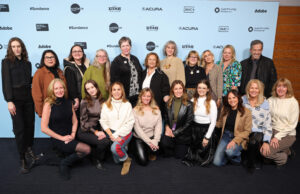By Stephanie Ornelas
There were several lessons director/screenwriter Rick Famuyiwa (The Wood, Dope) learned as he evolved into a successful filmmaker over the years. A big one: when it comes to getting your message across, you have to be comfortable with being uncomfortable.
Famuyiwa shared this takeaway — and several others — when he joined Michelle Satter, Founding Director of Sundance Institute’s Feature Film Program, for a Conversations From the Labs session in 2020.
The timing of the discussion could not have been better. It was Junteenth, a federal holiday commemorating the ending of slavery in the United States, and as Satter says, “It’s important to take a moment to acknowledge what today is.” She then offered viewers educational resources compiled by Sundance Institute staff. “This is for you to learn how you can contribute in your own way, but to also make this part of a collective action that Sundance is committed to.”
Both Dope and The Wood are a celebration of Black culture. They also highlight important issues like violence and racism. During the discussion (available to watch for free), Famuyiwa briefly talks about how he got started as a filmmaker, the resurgence of Black cinema, learning the rules of genre, and collaborating with actors.
Like so many filmmakers before him, Famuyiwa, a former Sundance fellow, was not planning to make movies. “I was going to become a lawyer like a good immigrant son should,” he laughs. “And then while I was [at USC], I ended up taking some film classes because I’ve always loved movies. It just clicked for me that this storytelling was something I wanted to do. I didn’t take it seriously until a writing instructor saw a short story I wrote. It was the seed that got planted in my head.”
When Famuyiwa first got accepted into the 1996 Sundance Film Festival for his short Black Top Lingo, he might have had no idea where his film career would go from there. He recalls Satter approaching him at the Festival and sharing her admiration for the film. He would soon be invited to join the Sundance Institute Directors Lab to work on his first feature film. When Satter asked Famuyiwa if he had a project in the works, he said yes, though he didn’t actually have a project in mind at that time. So he went back to the story that started it all — the original short story that his instructor complimented him on, now known as The Wood.
“I proceeded to write the movie in a couple of weeks. The Lab saw something in this film,” says Famuyiwa. “And that was the film that I had in the [Sundance] lab and ultimately it was the film that I met my producers and agents through.”
It was the Directors Lab that really helped shape the film, Famuyiwa explains. Through the intense program, he learned how to work with and create a safe space for actors as he filmed his first love scene, and figured out how it’s crucial to be flexible with new ideas.
While both coming-of-age movies have a funny, lighthearted theme, the real-life events that inspired the films are not. Famuyiwa wanted to make it known that he was inspired to make these movies about growing up Black in America after the shootings of Treyvon Martin and Michael Brown.
“The way these young men [Brown and Martin] were being portrayed [in the media], it affected me. So I wanted to make a story about being a Black kid and growing up. And the labs really helped me see certain ideas more clearly.” Famuyiwa continues, “It’s so important to be open to new ideas as a filmmaker. And when you’re writing from personal experiences, you have to be able to find that muscle that allows you to detach yourself, for the sake of the film. Because we are being judged by what’s on the screen, not by the intent.”
Nevertheless, Famuyiwa explains to viewers that there will always be moments where you have to cut something whether it’s due to budget or other reasons, but it’s important to be fully aware of the scenes that are essential — the ones that make a film what it is. It was a big lesson he learned when making his 2015 award-winning film DOPE.
The movie centers around high-school senior Malcolm (Shameik Moore) and his friends Jib and Diggy who bond over ’90s hip-hop culture, their studies and playing in their own punk band. After an encounter with a drug dealer at a nightclub turns violent, a wild adventure ensues as the three students try to evade armed thugs who want the stash.
When producers wanted Famuyiwa to cut one powerful line from the final scene to make the film easier to digest for white viewers, he stood behind his ideas and the line was ultimately kept in.
“You have to really decide what is essential and then you have to fight for it,” says Famuyiwa. “As directors, we’re seeing things before everyone does because we have to think about stories that aren’t out in the world yet, and we have to be comfortable with being uncomfortable. Because to tell something that has any kind of meaning — especially the stories that come through Sundance — you’re trying to say something. How far are you willing to go to say it?”
To view the entire video with Rick Famuyiwa and Michelle Satter, click here and sign up for Sundance Collab for free.




